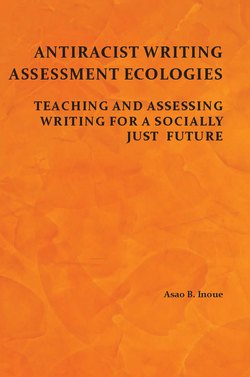Читать книгу Antiracist Writing Assessment Ecologies - Asao B. Inoue - Страница 7
На сайте Литреса книга снята с продажи.
ОглавлениеAcknowledgments
This book, like all others, is the culmination of more than my efforts. In many ways, I’m simply the messenger, shouting the news to others. Over the last five years, I’ve had lots of help thinking, rethinking, conceiving, discussing, and reading drafts of what would become what you hold in your hands. First, I thank my wife, Kelly Inoue, without whom I cannot do what I do every day. She makes me a better teacher, father, husband, scholar, and person just by living her example of compassionate service. I live in her long shadow and am grateful for her patience and love. I thank Victor Villanueva, my mentor and friend, who read parts of Chapter 1, and has been a constant encouragement to me. I learned much from him and his work about race and racism, and about being cheerful in the face of so much wrong in the academy. Victor is my surrogate academic father. I thank Bill Condon, my other mentor, who introduced me to the field of writing assessment. He was often on my shoulder as I wrote and revised drafts of this book. His broad smile and his gentle deep voice is always guiding me. I thank Norbert Elliot, who in subtle ways always gives me things to learn, some of which ended up in this book. I thank Mya Poe, my PIC, my friend, and from whom I’ve learned so much. I feel so fortunate to work with her, even though we are usually on two different coasts. I thank Chris Anderson, my first mentor, friend, and colleague from Oregon State University, whom I asked to read an earlier version of the book and who gave me valuable and important ideas. His kind and careful feedback was instrumental in making this book what it is. He was also one of my first teacher models in college, one who taught me that cultivating a compassionate ear is always the best pedagogical stance to take. I also wish to thank the incredible folks at Parlor Press and the WAC Clearinghouse, Mike Palmquist and his editorial team who made this manuscript sparkle; Sue McLeod, my editor, who was wonderful, encouraging and helpful.
Thank you to my twin brother, Tadayoshi L. Inoue, who has supported, loved, helped, and challenged me my entire life. I am always and ever-mindful of how deeply blessed and fortunate every minute of my life has been (I was born four minutes after my brother) to be a twin, and know twin-love. He has been the rock I have always had the privilege and good fortune to stand on and next to.
And then there are a number of folks who helped me along the way through conversations and emails: Tom Fox, who read the entire manuscript, gave me thoughtful and insightful ideas that made the book better in tangible ways; Carmen Kynard, who always has good things to say and encouragement to offer; Vershawn A. Young, my dear friend whom I can count on to push me and question everything; and Chris Gallagher, who offered crucial ideas to the guiding metaphor of the book (ecology) in a 45-minute meeting we had at Cs in Las Vegas. That meeting was the tipping point for me in thinking about the book and what it should ultimately be.
I offer a very special thanks to my graduate students at Fresno State, who were a constant source of inspiration, ideas, critiques, and joy while I was there. They taught and gave me more than I feel I ever offered them. And finally, I thank my undergraduate students at Fresno State, especially the students in my Fall 2012, English 160W course that make up much of Chapter 4, who often needed to have a lot of faith in me and what I asked of them. I am grateful for the labor and trust that each year my students give me and our classes. They are why I do what I do, and what makes my career, research, and life possible. I learn how to learn from them every year.
